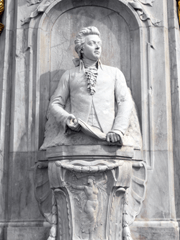Music revolution! Mozart. Rossini. Whatever next?
By uclzean, on 10 June 2014
After learning about the unity that could be achieved at the opera at my last UCL Festival of the Arts event, I was keen to actually experience an aria or two and learn more about the art form that had so compelled Nietzsche.
I was in luck. Will Bowers (UCL English), dressed in two-tone brogues and a pin-stripe suit, like a 1920s mobster who happened to specialise in the opera culture of the romantic period, led the event. Excerpts were sung by Carl Gombrich (bass, Programme Director UCL Arts and Sciences) and Emily Tsui (soprano, second year undergraduate, UCL Arts and Sciences) and Bryan Solomon (UCL Information Services Division) played piano.

Mozart
Bowers spoke with elegance and insight about all things 1780s-1820s opera culture. Opera was often performed with “no narrative. It was all about the virtuosity of the performer”. The audience would drink and gamble. The performers would riff and improvise melody and rehearsals were non-existent. Opera existed in a realm of miscellany and elitist debauchery.
It wasn’t until 1789 that the British opera began to shed the shaggy raiments of its past. The Haymarket theatre burnt to the ground and with Britain’s chief opera centre in cinders there was an opportunity for a rethink. The information explosion of the following decade helped in democratising debate and in siphoning opera into mainstream culture. The opera was a “complicated machine” and Britain was on the verge of a cultural renaissance.
Michael Novosielski was commissioned to redesign the new opera house. Based on the Teatro alla Scalla in Milan, it would become the second largest opera house in the world. In spite of this early ambition, it wasn’t until 1817 that British opera caught up with Europe when Mozart and Da Ponte’s Don Giovanni was finally performed, 30 years after its Prague debut.
Don Giovanni also marked the beginning of the “polite listening culture” that we still experience today at the theatre, the opera and in other artistic arenas. Shortly after Mozart debuted in London, Rossini’s operas became the soundtrack of the 1820s and by 1824 he was the “new conqueror”.
The excerpts performed throughout Bowers’s lecture were performed with gusto and precision, and were an entertaining way of learning about this period. Bowers spoke with clarity and authority, and it was interesting to learn about the niceties of operatic culture during this era.
It was great to end my Festival of the Arts at this event. I learnt a great deal and am even motivated enough to head down to the Royal Opera House and catch a full performance. By the time next year’s Festival of the Arts rolls around, I will no doubt be reciting Wagner and humming Verdi. Paul Potts, watch this space.
 Close
Close

